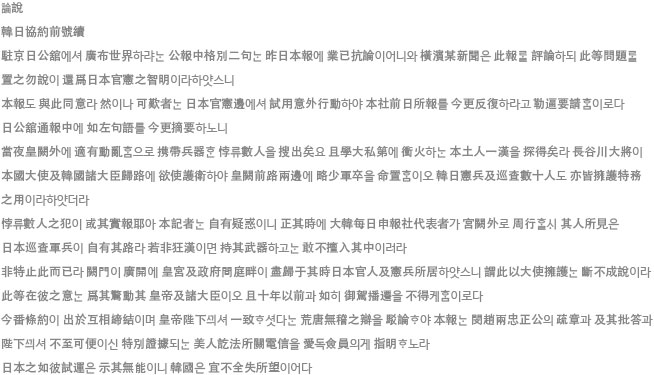



![]() > Media Center > Dokdo, the First Victim of Japan’s Aggression Against the Korean Peninsula > Korean People’s Awareness of Japan’s Aggression
> Media Center > Dokdo, the First Victim of Japan’s Aggression Against the Korean Peninsula > Korean People’s Awareness of Japan’s Aggression
Daehan Maeil Shinbo
Editorial
“Second Follow-up Report on the Korea-Japan Treaty (the Eulsa Restriction Treaty)”
This newspaper already refuted the two passages of the official gazette report that the Japanese Embassy in Seoul wanted to be widely proclaimed to the world. A newspaper in Yokohama in its critique of this report (yesterday’s rebuttal) remarked that the Japanese authorities' not saying anything about it shows its wisdom, to which this newspaper agrees.What is lamentable, nonetheless, is that the Japanese authorities have put to trial an unexpected action by compelling this newspaper to repeat what it previously reported.The points of the notice by the Japanese Embassy are given here again as follows: as it happened, there was a riot outside the imperial palace on the night in question. A search led to the arrest of a few thugs carrying weapons, and a Japanese person setting fire to the private residence of the Education Minister was caught. To escort the Japanese Ambassador and many Korean ministers leaving the palace, General Hasegawa* ordered the placement of a handful of soldiers on either side of the road in front of the palace. Dozens of Korean and Japanese military policemen and policemen were also mobilized for the special duty of escort. “A few thugs” was what was actually indicated in the notice. This journalist has his own share of suspicions: that is, the representative of the Daehan Maeil Shinbo was wandering about around outside the palace right at that time. According to what he saw, the Japanese policemen and soldiers placed themselves on that road, and no one but a mad man would dare to enter among them with a weapon.
Not only that, the palace gate was wide open and the yards of the palace and the government became occupied by the Japanese officials and military police at the time when everyone had left. Claiming that this was escorting of the Ambassador is total rubbish. What they targeted in all this was the Emperor and the ministers, who were frightened out of their wits, as well as to prevent royal refuge like that ten years ago.** To rebut the absurd claim that this treaty was a result of mutual understanding and that the Emperor approved it, this newspaper clearly points you, devoted readers, to the pleadings with the throne by two loyal officials Min and Jo***, the Emperor’s answer to them, and a telegram sent to the American Mr. Hulbert****, which providesstrong evidence that the Emperor did not approve the treaty.The trial like that by Japan only demonstrates its incompetence, and naturally, it is not that Korea has lost all of its hope.
* Yoshimichi Hasegawa later served as Japanese governor-general of Korea from 1916 to 1919.
** Korean royal refuge at the Russian legation in 1896
*** Min Yeong-hwan and Jo Byeong-se are two of the few Korean officials who committed suicide in protest against the Eulsa Restriction Treaty.
**** Homer Hulbert (1863–1949), an American missionary and journalist who advocated Korea’s independence
